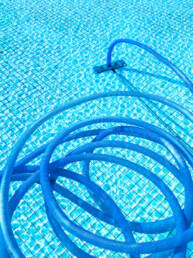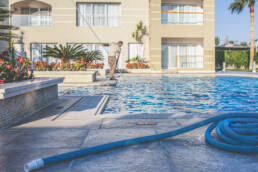Welcome to the Laguna Pools blog, your trusted pool maintenance company in Denver, CO. At Laguna Pools, we understand that a pool is more than just a place to cool off during the hot summer months; it’s a center for family fun, exercise, and relaxation. However, with the joy and convenience of having a pool comes the serious responsibility of ensuring safety for your family, friends, and guests. That’s why we’ve put together this comprehensive guide to pool safety.
In this guide, we’ll dive into the essential aspects of pool safety, from understanding the risks associated with pool ownership to implementing proactive measures that protect everyone who enjoys your pool. Whether you’re a new pool owner or looking to reinforce the safety of your existing setup, this guide is designed to provide valuable insights and practical tips to keep your pool area secure and enjoyable for everyone.
Understanding the Risks
Awareness is the first step toward prevention. It’s crucial to recognize the potential dangers that come with owning a pool. Unfortunately, pools can be the site of accidents and incidents ranging from minor injuries to tragic drownings. The Centers for Disease Control and Prevention (CDC) reports that drowning is a leading cause of unintentional injury death among children aged 1-4 years and the second leading cause among children aged 5-14 years. These statistics highlight the critical need for stringent safety measures around pools.
Common Pool-Related Accidents Include
- Drownings and Near-Drownings: Lack of supervision, inability to swim, and failure to recognize distress signs can lead to drowning incidents.
- Slips and Falls: Wet surfaces around pools are notoriously slippery, increasing the risk of falls that can cause injuries ranging from minor bruises to serious fractures.
- Diving Injuries: Incorrectly judging the depth of the water or diving into shallow areas can result in head, neck, and spinal injuries.
- Chemical Burns and Poisonings: Improper handling and storage of pool chemicals can cause burns, respiratory problems, and poisonings.
Case Studies for Consideration
- A family gathering turns urgent when a child slips into the pool unnoticed. Thanks to vigilant supervision, the child is quickly rescued, underscoring the importance of constant adult supervision.
- A teen dives into a shallow end of a pool, resulting in a concussion. This incident serves as a stark reminder of the need for clear rules and signage around pool usage.
Understanding these risks isn’t meant to scare you but to prepare you. Knowledge empowers us to take proactive steps to mitigate these dangers, ensuring that our pools remain sources of joy, not tragedy. Stay tuned as we explore essential pool safety equipment in the next section of this guide, offering you the tools and knowledge to create a safer pool environment for everyone.
In the spirit of safety and enjoyment, let’s make every pool day a safe one. Laguna Pools is here to help you every step of the way, ensuring that your pool remains a safe haven for all.
Establishing Safe Pool Behaviors and Rules
Creating a culture of safety around your pool is just as important as installing physical safety measures. Establishing and enforcing a set of pool rules can significantly reduce the risk of accidents. Here are some key behaviors and rules to promote among all pool users:
Supervision
Never underestimate the power of vigilant supervision. An adult should always be present and actively watching children in and around the pool. This means no distractions — smartphones, books, or deep conversations should take a backseat to watching over swimmers.
Swimming Skills
Encourage everyone in your household to learn to swim. Consider enrolling children in swimming lessons at an early age and promote water competency, which includes skills like floating, treading water, and swimming a short distance.
Guest Management
Hosting a pool party? Assign a designated watcher to keep an eye on the pool at all times, or consider hiring a lifeguard for larger gatherings. Limit the number of guests to ensure the pool area does not become overcrowded.
Rules Signage
Clearly post pool rules where all guests can see them. Include guidelines about diving, running, horseplay, and the use of flotation devices. Reminding adults about the importance of not swimming alone can also enhance safety.
Creating a Safer Pool Environment
A safe pool environment is the foundation of pool safety. Regular maintenance and proactive measures can prevent accidents and enhance the overall pool experience. Here are some strategies for creating a safer pool environment:
- Regular Maintenance Checks: Ensure your pool and its surrounding area are always in good condition. Regularly check for and repair any damaged tiles, loose boards, or sharp edges. Keep the pool water clean and clear, maintaining proper chemical balances to prevent infections and ensure the water is safe for all swimmers.
- Slip-Proofing: Wet surfaces are inevitable around pools, but you can minimize the risk of slips and falls. Install non-slip mats or slip-resistant coatings around the pool deck. Encourage the use of water shoes or flip-flops when not in the pool to increase traction.
- Chemical Safety: Store pool chemicals in a cool, dry place away from direct sunlight and out of reach of children and pets. Always follow manufacturer instructions for use and disposal. Wear protective gear, like gloves and goggles, when handling chemicals to prevent burns or inhalation hazards.
- Electrical Safety: Ensure all pool lighting and electrical installations comply with local codes and are specifically designed for pool use. Regular inspections by a qualified electrician can prevent electrical hazards. Keep electrical devices and cords away from the pool and wet areas.
Implementing these strategies requires a commitment to safety and a willingness to invest time and resources. However, the peace of mind that comes from knowing your pool is as safe as it can be is invaluable. In our next section, we will discuss the importance of emergency preparedness, including how to respond effectively in case of a pool accident.
By taking these proactive steps, you not only safeguard your loved ones but also create an environment where pool memories are joyful and free from harm. Laguna Pools is committed to helping you achieve this goal, offering expert advice and services to enhance the safety and enjoyment of your pool.
Emergency Preparedness
Even with stringent safety measures in place, emergencies can still occur. Being prepared to respond quickly and effectively can make a significant difference in the outcome. Here’s how to ensure you’re ready:
CPR and First Aid
It’s crucial for adults and caretakers in the household to be trained in CPR and First Aid. Local community centers, hospitals, and organizations like the American Red Cross often offer these lifesaving courses. Regular refreshers are important to keep these skills sharp.
Emergency Plan
Develop a clear, straightforward emergency action plan and make sure everyone in the household understands it. This plan should include steps on how to respond to different types of emergencies, such as drownings, falls, or chemical spills. Practice this plan periodically with all members of your family and any regular visitors to the pool.
Emergency Contacts
Post a list of emergency contacts, including local emergency services, the nearest hospital, and a poison control center, in a visible area near the pool. Ensure that at least one waterproof, fully charged phone is accessible at all times in the pool area for emergency calls.
Leveraging Technology for Pool Safety
Innovations in technology offer additional layers of security and peace of mind for pool owners. Here’s a look at how you can integrate the latest safety technologies with traditional safety measures:
- Smart Alarms: Modern pool alarms go beyond basic alerts. They can notify you directly on your smartphone if someone enters the pool area or falls into the water, allowing for immediate response even if you’re not physically present.
- Pool Safety Apps: There are several apps designed to enhance pool safety, including those that help you monitor water quality, track who is using the pool, and provide quick access to emergency procedures and contacts.
- Automatic Pool Covers: With the touch of a button, these covers can securely seal your pool, preventing unsupervised access by children, pets, or wildlife. They also offer the added benefits of keeping your pool clean and reducing evaporation.
- Surveillance Cameras: Installing cameras around your pool area can help you monitor activity even when you’re not there. Opt for waterproof models with night vision and consider storage options that allow you to review footage if needed.
Conclusion
Ensuring the safety of your family and guests around the pool requires attention to detail, commitment, and ongoing education. By understanding the risks, establishing rules and safe behaviors, creating a secure environment, preparing for emergencies, and incorporating technology, you can significantly reduce the likelihood of accidents and injuries.
Laguna Pools is dedicated to helping Denver, CO, residents enjoy their pools to the fullest, with peace of mind knowing that they’ve taken the steps to protect their loved ones. Whether you’re looking for a professional safety consultation or need assistance implementing any of these safety features, we’re here to help.
Don’t wait until it’s too late to prioritize pool safety. Contact Laguna Pools today to learn more about our safety assessments and upgrades. Share this guide with fellow pool owners and help us spread the word about creating safer pool environments for everyone. Together, we can make a difference in preventing pool-related accidents and injuries.
Remember, a safe pool is a source of joy and relaxation for everyone. Let’s keep it that way.

Ready for an expert opinion? Get in touch today!
Laguna Pools is a professional pool and spa contractor that has been servicing the Denver area for over 20 years. We offer routine cleaning and maintenance services, new pool design, construction, and remodeling.
Like this article? Spread the word!
Related Posts
February 28, 2024
Revitalize Your Backyard Oasis: Upgrading Your Pool and Spa for Maximum Enjoyment
Transform your backyard into a tranquil oasis with Laguna Pools in Denver. Explore modern…
April 12, 2023
Make Your Pool the Ultimate Gathering Spot With These Five Tips
Our highly rated Denver pool design and installation company is sharing five tips to turn…
April 23, 2024
Dive In: Top Five Reasons to Use Laguna Pools for Your Denver Area Pool Maintenance
Discover the top five reasons to choose Laguna Pools for your Denver area pool…





